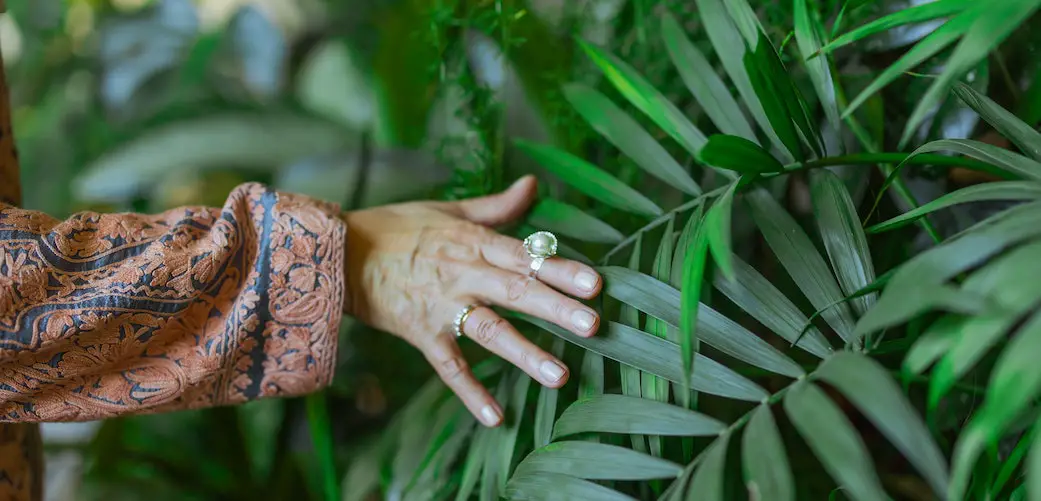If you’re looking for the most efficient ways to care for your indoor plants, you may have wondered if it’s ok or not to touch your plants.
You might also like touching your plant, but make sure you take into account if touching your plant can harm it or not.
Here’s Whether Plants Like Being Touched or Not:
The answer is no, plants don’t like being touched. It’s recently been shown plants react to physical contact and things like rain, movement near them, or a light touch from a human trigger a huge gene response in the plant. Essentially, touching plants triggers an upset in them.
Can Plants Feel When You Touch Them?
Yes, plants can feel when you touch them. They respond rapidly to any physical contact with their own leaves, water, other plants and human touch.
This surprised many of the scientists who were involved in the studies that showed this, but it seems to be very clear that plants can feel when you touch them.
You can actually test this for yourself with certain plants.
Mimosa Pudica will visibly fold up, shrinking away from the touch of a person or animal that brushes their leaves.
Other plants may not have such a clear response, but they certainly react to the sensation of something touching their leaves.
Plants can even feel other plants touching them when the wind blows, and respond to this touch as part of their environmental stimuli.
There is no question that plants pay as much attention to physical contact as other organisms do, even if they can’t show it in such obvious ways.
Is It Bad To Touch Your Plants?
Yes, on the whole, it is bad to touch your plants. They respond to touch with stress, which makes sense when you think about what being touched often means to a plant: that something is eating it.
 Researchers discovered that even a small touch can produce stress hormones, and that plants react almost immediately.
Researchers discovered that even a small touch can produce stress hormones, and that plants react almost immediately.
Plants that are touched a lot end up spending large amounts of time stressed, and – as many of us know – extended periods of stress can be very damaging to an organism’s health.
Some research has indicated that it is possible for touch to occasionally have positive benefits for a plant.
Because of the stress, a small amount of touch can stimulate growth and encourage a plant to shoot up.
Plants that think they are dying often produce more flowers and fruit, in an attempt to make sure the next generation survives.
This is similar to the way humans benefit from small amounts of stress – it encourages us to work hard, and sometimes helps us to accomplish great feats.
However, we all know that stress is not good for our health.
Plants that are stressed may put a lot of energy into growing, but this stress over time is not good for the plants.
The long term effects of stress can be dramatic, and the plant’s growth will be hindered overall, giving you a weaker and less happy plant.
A recent study done by the La Trobe Institute for Agriculture and Food discovered that within 30 minutes of being touched, up to ten percent of the plant’s genome might have altered.
All the energy that is poured into making these alterations cannot be put toward the plant’s growth, and so they lose a significant amount of their energy for no gain.
You might be wondering why plants respond in this way. How does it benefit them?
On the whole, it probably doesn’t, but in some cases, plants have been shown to respond to the touch of insects by releasing chemicals that repel the insects.
Equally, it’s possible that the fact they respond to other plants touching them helps them determine which way to grow – and prevents them from trying to grow into a space already occupied by another plant.
This may slow down their overall growth, but could save them from competing for nutrients and sunlight.
A lot more study is needed to understand why plants respond negatively to touch, but so far, it’s clear that they do! Touching your plants is not good for them.
Can Touching Plants Kill Them?
Handling plants is unlikely to kill them in most circumstances.
Although touching can hamper their growth and stress them out, it isn’t so damaging that it’s likely to do major, long-term damage.
You don’t need to shy away from brushing against your beloved green friends if you need to give them a good clean, trim their leaves or handle them once in a while.
However, in very extreme circumstances, it’s possible that touching a plant excessively could contribute to its death.
If the plant is already sick and stressed, a lot of handling might further stress it to the point that it dies.
Unfortunately, we tend to handle sick plants while we attempt to work out what’s wrong with them, and this might be making the situation worse.
Usually, there will be other contributing factors to the death, but you should bear in mind that if a plant is already ill, handling it a lot is not the best idea, and could make it worse.
If possible, avoid touching sick plants, or even casting your shadow over them too often – it’s thought that something as simple as a shadow that covers a leaf and then moves away quickly can trigger a plant’s stress hormones.
Sick plants should be given the care they need, and then left to recover in peace, without constant disruptions.
Equally, handling seedlings a lot might cause them to die, simply because they are already vulnerable and have limited energy reserves.
If that energy gets wasted by the plant being stressed, you are likely to find that the seedlings struggle, or possibly even die because they put too much energy into responding to touch.
Handling a healthy plant, even a lot, is unlikely to kill it, but it could be detrimental to its growth.
You might slow down your plant’s leaf production or make it reluctant to bloom if you keep poking it.
Try and enjoy your plants with your eyes, and keep your hands away – even if their leaves have a seemingly irresistible texture.
What Plants Can You Touch?
So far, it’s unclear if there are plants that do not mind being touched.
Some species are probably more resistant to handling than others, but this may just be down to the hardiness of the plant, rather than a specific enjoyment for touching.
For example, tough plants such as the Cast Iron Plant might handle touch more readily than tender plants such as an orchid.
However, further study is needed for us to truly understand whether some plants may gain benefits from being touched by people, or whether all plants hate to be handled and are negatively affected by touch.
Here are a few tough indoor plants that might be less likely to be damaged by touching:
- Peace Lily
- Aloe
- Jade Plant
These are generally hard-to-kill plants, so they should tolerate you touching them from time to time.
3 Plants That Hate Being Touched
Here are a few plants that are known to hate being touched:
1) Mimosa Pudica
We have already mentioned that Mimosa Pudica doesn’t like to be touched, and indeed it is sometimes referred to as the touch-me-not plant or the shameplant.
These plants are known for disliking their leaves being handled, and they spend valuable energy shrinking away from any physical contact.
This is thought to discourage predatory insects, which might prefer a meal that doesn’t move from under them, and it might also help to dislodge said pests from the plants’ leaves. However, it is unclear whether the plant’s defensive mechanism serves other purposes too.
2) Venus flytrap
So far, research hasn’t gone into enough detail to understand which species might particularly hate being touched, but we know that Venus flytrap suffers if you touch the hairs in its traps.
It responds to this touch by snapping the traps shut and producing digestive juices, so touching those forces the plant to waste energy.
3) Maidenhair Fern
It’s thought that the oils on your fingers might be damaging to the light fronds of a Maidenhair Fern, so you should also avoid touching these where possible.
Whether it has a particularly strong stress response to touch or not hasn’t been researched yet.
Overall, it seems likely that most plants hate being touched.
There is no evolutionary advantage to liking being touched, but there are plenty of reasons that touch can stress plants out, trigger hormones that encourage them to grow in other directions, or prompt them to release chemicals that deter insects.
Therefore, it may be that all plants hate being touched, and you should refrain from stroking or handling the leaves where possible – even if you are trying to dust them.
Minimize contact between your plants and all external stimuli, and you might see better growth as a result!
Final Thoughts
If you can avoid handling your plant, do so.
Your plant may appreciate talking, music, singing, water, fertilizer, light, and many other things that you do for it, but it does not appreciate you invading its personal space.
Try to minimize the amount of contact that you have with your plant, and let it grow in peace.
Obviously, there will be times when you have to touch your plant, but try not to do so with very small seedlings or with sick plants – you could make them much worse.
On the whole, touch tells a plant that something is threatening it, and its stressed response is detrimental to the overall health and growth of the plant.
References
La Trobe Institute for Agriculture and Food – Plants don’t like being touched.


